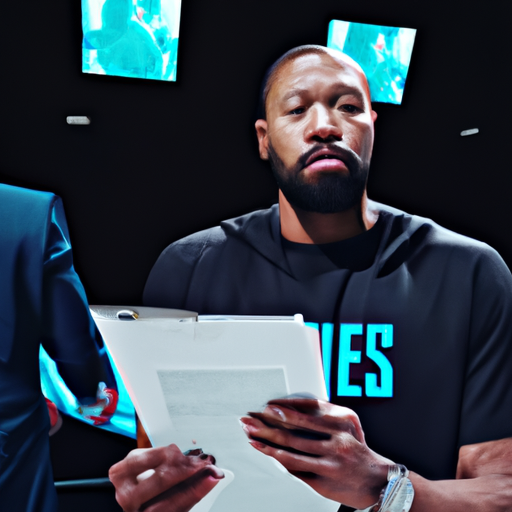Gilbert Arenas reveals how Doc Rivers outmaneuvered Ty Lue for 76ers job

The Background and Career of Gilbert Arenas
Gilbert Arenas, a former NBA player known for his sharpshooting skills and controversial off-court behavior, recently made headlines when he revealed how Doc Rivers outmaneuvered Ty Lue for the Philadelphia 76ers head coaching job. To understand the significance of Arenas’ revelation, it is important to delve into his background and career.
Born on January 6, 1982, in Tampa, Florida, Gilbert Arenas quickly rose to prominence as a basketball prodigy. He attended Grant High School in Los Angeles, where he showcased his exceptional talent on the court. Despite facing numerous challenges, including a lack of exposure and limited college scholarship offers, Arenas managed to secure a spot at the University of Arizona.
During his time at Arizona, Arenas continued to impress with his scoring ability and clutch performances. In 2001, he declared for the NBA Draft and was selected in the second round by the Golden State Warriors. Although he initially struggled to find his footing in the league, Arenas eventually blossomed into a star player during his tenure with the Washington Wizards.
Arenas’ time in Washington was marked by his scoring prowess and entertaining personality. He became known for his ability to hit difficult shots from all areas of the court, earning him the nickname “Agent Zero.” However, his career took a turn for the worse when he was involved in a highly publicized incident in 2009. Arenas brought guns into the Wizards’ locker room, resulting in a suspension and tarnishing his reputation.
Despite the controversy, Arenas continued to play in the NBA for several more years, bouncing around different teams before ultimately retiring in 2013. Since then, he has remained involved in basketball through various ventures, including media appearances and coaching clinics.
It was during one of these media appearances that Arenas shed light on the behind-the-scenes maneuvering that led to Doc Rivers being chosen over Ty Lue for the 76ers coaching job. According to Arenas, Rivers’ reputation and track record played a significant role in swaying the decision-makers.
Rivers, a highly respected coach with a championship pedigree, had previously led the Boston Celtics to an NBA title in 2008. He also had successful stints with the Orlando Magic and Los Angeles Clippers, earning a reputation for his ability to connect with players and maximize their potential.
On the other hand, Ty Lue, who had won a championship as a coach with the Cleveland Cavaliers in 2016, was seen as a rising star in the coaching ranks. However, his lack of experience compared to Rivers seemed to work against him in the 76ers’ decision-making process.
Arenas explained that Rivers’ ability to articulate his vision for the team and his proven ability to navigate the complexities of coaching in the NBA ultimately won over the 76ers’ front office. While Lue was undoubtedly a strong candidate, Rivers’ track record and reputation gave him the edge.
In conclusion, Gilbert Arenas’ recent revelation about Doc Rivers outmaneuvering Ty Lue for the Philadelphia 76ers coaching job sheds light on the importance of experience and reputation in the decision-making process. Despite his controversial past, Arenas’ insights into the NBA coaching landscape provide valuable context for understanding the dynamics at play in such high-stakes decisions.
Analyzing Doc Rivers’ Coaching Strategies

Gilbert Arenas, former NBA player and three-time All-Star, recently shed light on the behind-the-scenes maneuvering that led to Doc Rivers securing the head coaching position for the Philadelphia 76ers over Ty Lue. As a basketball enthusiast, it is fascinating to delve into the strategies employed by coaches to secure coveted coaching positions in the NBA.
Arenas revealed that Doc Rivers’ ability to outmaneuver Ty Lue for the 76ers job was primarily due to his reputation as a seasoned coach with a proven track record. Rivers, who had previously coached the Boston Celtics to an NBA championship in 2008, had established himself as a respected figure in the league. His experience and success with the Celtics, as well as his subsequent coaching stints with the Los Angeles Clippers, made him an attractive candidate for any team in need of a head coach.
Furthermore, Rivers’ ability to connect with players and build strong relationships was another factor that worked in his favor. He was known for his ability to motivate and inspire his players, creating a positive team culture that fostered success. This was evident in his time with the Clippers, where he helped transform the team from perennial underachievers to consistent playoff contenders.
In contrast, Ty Lue, who had previously coached the Cleveland Cavaliers to an NBA championship in 2016, did not possess the same level of experience and success as Rivers. While Lue had proven himself as a capable coach, his limited track record and lack of championship pedigree may have worked against him in the eyes of the 76ers’ management.
Arenas also highlighted Rivers’ ability to adapt his coaching style to fit the needs of his team. He emphasized that Rivers was not rigid in his approach and was willing to make adjustments based on the strengths and weaknesses of his players. This flexibility allowed him to maximize the potential of his roster and make the necessary strategic decisions to win games.
Additionally, Rivers’ reputation as a strong leader and communicator played a significant role in his selection as the 76ers’ head coach. He was known for his ability to effectively communicate with his players, earning their trust and respect. This was crucial in a team like the 76ers, which boasted talented players like Joel Embiid and Ben Simmons, who needed a coach capable of guiding them to their full potential.
In conclusion, Gilbert Arenas’ insights into the hiring process that led to Doc Rivers securing the head coaching position for the Philadelphia 76ers shed light on the strategies employed by coaches to secure coveted coaching positions in the NBA. Rivers’ reputation as a seasoned coach with a proven track record, his ability to connect with players and build strong relationships, his adaptability, and his leadership and communication skills all played a significant role in his selection over Ty Lue. As fans, it is fascinating to analyze the coaching strategies employed by successful coaches like Rivers and understand how they navigate the competitive landscape of the NBA.
Comparing the Coaching Styles of Doc Rivers and Ty Lue
Gilbert Arenas, former NBA player and three-time All-Star, recently shed light on the behind-the-scenes dynamics that led to Doc Rivers being chosen over Ty Lue as the head coach of the Philadelphia 76ers. In a recent interview, Arenas revealed how Rivers outmaneuvered Lue for the coveted position, highlighting the stark differences in their coaching styles.
One of the key factors that worked in Rivers’ favor was his extensive experience as a head coach in the NBA. With over two decades of coaching under his belt, including a championship win with the Boston Celtics in 2008, Rivers brought a wealth of knowledge and a proven track record to the table. This undoubtedly impressed the 76ers’ management, who were looking for a seasoned leader to guide their talented roster.
On the other hand, Ty Lue, while having some coaching experience, was relatively new to the head coaching role. Lue had previously served as an assistant coach under Rivers during their time together with the Los Angeles Clippers, but his limited experience as a head coach may have been a disadvantage in this particular scenario. Despite his success in leading the Cleveland Cavaliers to an NBA championship in 2016, Lue was still seen as a relatively untested candidate compared to Rivers.
Another aspect that worked in Rivers’ favor was his reputation for being a strong communicator and a player’s coach. Throughout his career, Rivers has been known for his ability to connect with his players on a personal level, earning their trust and respect. This was evident during his time with the Clippers, where he successfully managed a roster filled with strong personalities and egos. His ability to foster a positive team culture and create a supportive environment was likely seen as a valuable asset by the 76ers’ management.
In contrast, Lue’s coaching style has been described as more authoritarian and demanding. While this approach can be effective in certain situations, it may not have been the best fit for a team like the 76ers, who have a young and talented roster that requires nurturing and guidance. The management may have felt that Rivers’ more player-centric approach would be better suited to maximize the potential of their young stars, such as Joel Embiid and Ben Simmons.
Furthermore, Rivers’ reputation for being a defensive-minded coach may have also played a role in his selection. The 76ers have long been known for their defensive prowess, and Rivers’ track record in developing strong defensive systems would have been appealing to the team’s management. Lue, on the other hand, has been associated more with offensive strategies, which may not have aligned as well with the team’s identity and goals.
In conclusion, Gilbert Arenas’ revelations shed light on the factors that led to Doc Rivers being chosen over Ty Lue as the head coach of the Philadelphia 76ers. Rivers’ extensive coaching experience, his reputation as a strong communicator and player’s coach, and his defensive-minded approach likely played a significant role in his selection. While Lue’s success as a head coach and his offensive strategies cannot be discounted, it seems that the 76ers’ management believed that Rivers’ coaching style was better suited to maximize the potential of their talented roster. Only time will tell if this decision proves to be the right one for the 76ers, but for now, it is clear that Rivers’ coaching style won over the hearts and minds of the team’s decision-makers.

